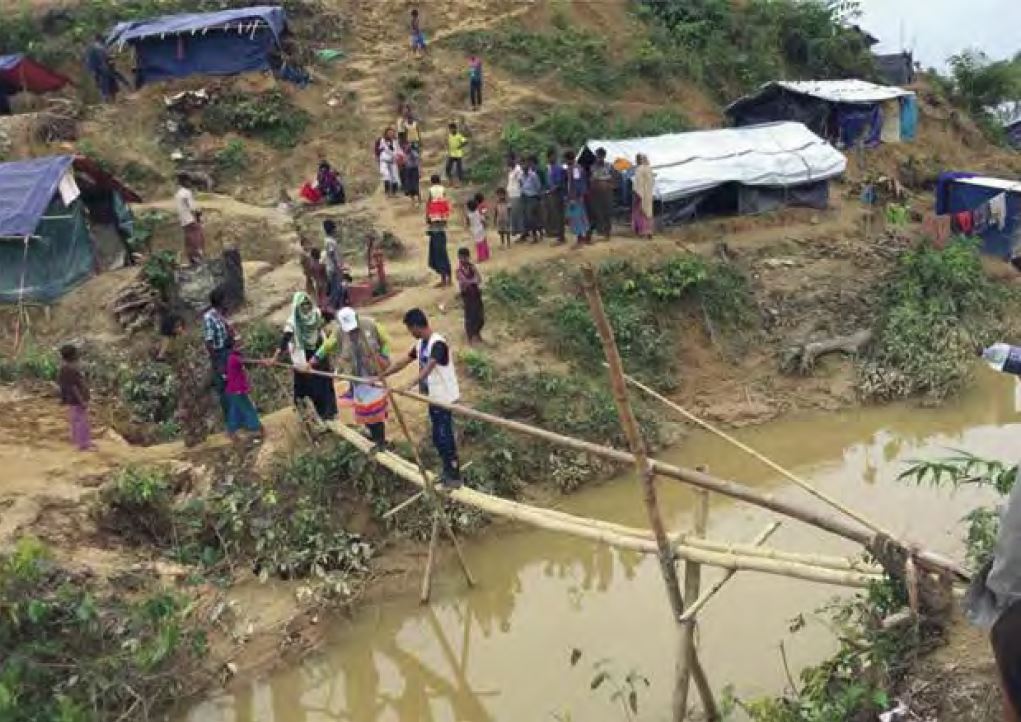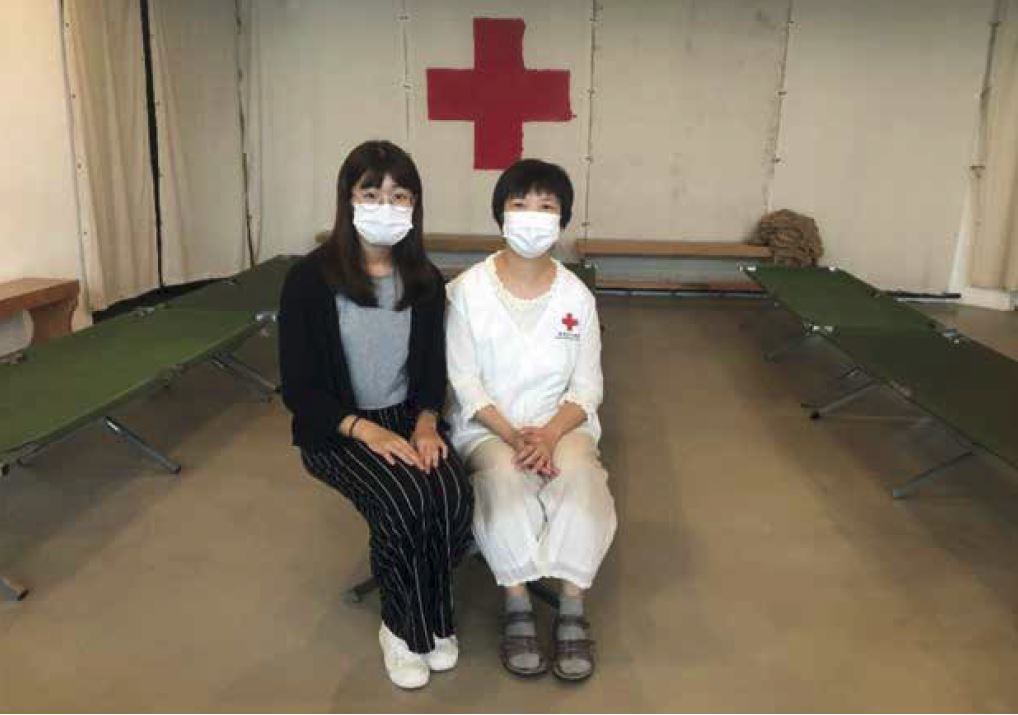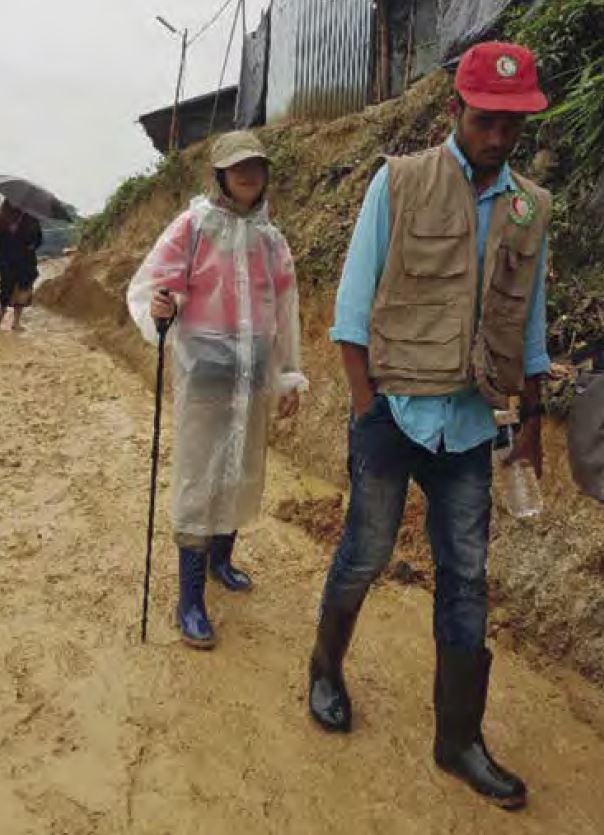Hong Kong Academy of Medicine. CC BY-NC-ND 4.0
HEALTHCARE FOR SOCIETY
Paediatrician in field hospitals: an interview with Dr Maggie Yeung
Nicole Lau1, Ricky Yau2
1 Year 3, The Chinese University of Hong Kong
2 Year 4, The Chinese University of Hong Kong
Dr Maggie Man-chow Yeung is a specialist in
Paediatrics, the recipient of The Chinese University
of Hong Kong Distinguished Medical Alumni Award
(Humanitarian Service) 2019, and a long-time
volunteer paediatrician at Hong Kong Red Cross
(HKRC).
When Dr Yeung was just 9 years old, she saw
a photo of a bone thin boy from Ethiopia in the
newspaper. Moved by the level of starvation and
deprivation this boy suffered, the young Dr Yeung
started dreaming about treating sick children when
she grows up. She reminds us, ‘There are still many
young children in impoverished parts of the world
struggling to survive.’
Dr Yeung heard about the humanitarian
services provided by HKRC. However, when she first
inquired in 2002, Dr Yeung found out that the training
programme was prioritising recruitment of surgeons
and midwives at that time. Fortunately, recruitment
of a broader spectrum of professions opened in 2007,
enabling Dr Yeung to realise her childhood dream of
treating sick children as a frontline doctor. Her journey
began after taking a basic training course at HKRC
and learning the necessary knowledge and skills to work in and operate a Health Emergency Response
Unit. Emergency Response Units are made up of a
team of trained personnel and sets of standardised
equipment that are deployed in emergency situations
to provide functions and services such as logistics, IT
and telecommunications, water and sanitation, relief,
and base camp. Dr Yeung has been volunteering
since 2008 in many different environments, including
places affected by natural disasters, such as Sichuan
and the Philippines, or where people affected have
escaped to, such as Jordan and Greece.
‘Flexibility is vitally important’ says Dr Yeung.
Although this is taught in the training course, it is
only understood when practising adaptability in
the field. In most missions that Dr Yeung was engaged
with, the purpose of the Health Emergency Response
Unit was mostly to support clinical services that had
been disrupted by disasters. Often,
the traditional customs and practices of the local
people may lead them to reject antibiotics and other
treatments. These logistical issues and cultural beliefs
unique to local communities can hinder the delivery
of effective healthcare. This is where adaptability
comes into play. Dr Yeung believes in respecting local
customs while incorporating an appropriate portion
of Western medicine into local situations. In Greece, she witnessed a patient with second- to third-degree
burns who requested a witch doctor. ‘Miraculously,
it worked, and we didn’t know why,’ recalls Dr Yeung.
Many cultures and societies are naturally suspicious
of “outsiders”. When such people feel that their local
customs and practices are respected by the foreign
humanitarian workers, they are more likely to trust
in these foreigners and become more receptive to the
services provided by the Emergency Response Unit in
their community. There are bound to be limitations
of Western medicine in these locations, especially
with the occasional unavailability of equipment. It
is therefore essential that humanitarian workers can
adjust their mindset before every mission, and can
exercise flexibility to meet the needs of their patients
in various ethnic communities.
Among the many overseas humanitarian
missions that Dr Yeung has been on, what has
touched her most is the way displaced people value
their family. Surviving in a disaster when personal
safety is jeopardised and uncertainties prevail, Dr
Yeung noticed that many displaced people place
family ahead of their own health and wealth. On
one occasion, Dr Yeung was taking care of a mother
who had just given birth in a field hospital in Jordan a few hours before. This woman requested to return
to the camp so that she could be with her family.
Recovering from the pain of delivery seemed less
imminent than being with her loved ones. These
anecdotes were not rare among displaced people.
None of them knew what might come next—more
damage and destruction, sudden injuries or deaths,
but rarely the end of chaos. Staying close to family
during times of such uncertainty and upheaval is a
lesson Dr Yeung well learned.
Family provides a sense of emotional security
and comfort that is necessary in building the
determination to survive through difficult times
and unpredictable missions. Even distance cannot
separate family. Dr Yeung feels deeply that nothing
is more powerful a driving force than support from
her family. Before embarking on a mission, Dr
Yeung always seeks support and approval from her
family. On one occasion, after returning home from
a particularly exhausting mission, she was greeted
with a smile and the comment, ‘You smell!’ Dr Yeung
read between the lines and knew that her family
misses her and supports her no matter what.
The picture of the starving boy in Ethiopia has
stuck with Dr Yeung in every one of her missions. It has motivated her not only to improve the physical
condition of her patients, but also to let them know
that someone cares about their existence and well-being.
As a volunteer of the HKRC, Dr Yeung has
been trained to work closely with members of the
local medical communities so that clinic services
initiated by humanitarian workers can continue even
after they leave.
Through sharing her experiences in
humanitarian work, Dr Yeung wants to prepare future medical volunteers for potential challenges
and frustrations in the field. More importantly, she
shows us that it is the heart that values human dignity
and human life that enables frontline humanitarian
workers to overcome obstacles in the field. Dr Yeung
finds true meaning in her work by using the ability to
heal to achieve humane outcomes for impoverished
communities. As Hippocrates wrote, “Wherever
the art of medicine is loved, there is also a love of
humanity.”
The Hong Kong Red Cross recruits volunteers, including doctors, nurses, and other professionals,
to participate in overseas emergency health missions. For more information, visit the website: https://volunteer.redcross.org.hk

Figure 2. A thin bamboo footbridge in Bangladesh.
‘Beneath that thin bamboo footbridge was muddy water. We had to cross it to build a field clinic up on the hill, with or without muddy water soaking our clothes,’ remarks Dr Yeung, ‘Thinking about my family in such difficult conditions gave me strength to endure such difficult conditions.’

Figure 3. Dr Yeung (right) and HKMJ student reporter, Nicole Lau (left) attending the interview at the Hong Kong Red Cross headquarters in West Kowloon, Hong Kong


